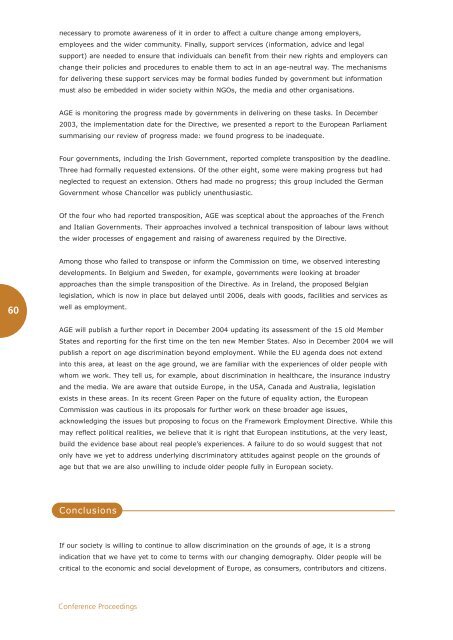From Ageism to Age Equality: Addressing the Challenges ...
From Ageism to Age Equality: Addressing the Challenges ...
From Ageism to Age Equality: Addressing the Challenges ...
You also want an ePaper? Increase the reach of your titles
YUMPU automatically turns print PDFs into web optimized ePapers that Google loves.
necessary <strong>to</strong> promote awareness of it in order <strong>to</strong> affect a culture change among employers,employees and <strong>the</strong> wider community. Finally, support services (information, advice and legalsupport) are needed <strong>to</strong> ensure that individuals can benefit from <strong>the</strong>ir new rights and employers canchange <strong>the</strong>ir policies and procedures <strong>to</strong> enable <strong>the</strong>m <strong>to</strong> act in an age-neutral way. The mechanismsfor delivering <strong>the</strong>se support services may be formal bodies funded by government but informationmust also be embedded in wider society within NGOs, <strong>the</strong> media and o<strong>the</strong>r organisations.AGE is moni<strong>to</strong>ring <strong>the</strong> progress made by governments in delivering on <strong>the</strong>se tasks. In December2003, <strong>the</strong> implementation date for <strong>the</strong> Directive, we presented a report <strong>to</strong> <strong>the</strong> European Parliamentsummarising our review of progress made: we found progress <strong>to</strong> be inadequate.Four governments, including <strong>the</strong> Irish Government, reported complete transposition by <strong>the</strong> deadline.Three had formally requested extensions. Of <strong>the</strong> o<strong>the</strong>r eight, some were making progress but hadneglected <strong>to</strong> request an extension. O<strong>the</strong>rs had made no progress; this group included <strong>the</strong> GermanGovernment whose Chancellor was publicly unenthusiastic.Of <strong>the</strong> four who had reported transposition, AGE was sceptical about <strong>the</strong> approaches of <strong>the</strong> Frenchand Italian Governments. Their approaches involved a technical transposition of labour laws without<strong>the</strong> wider processes of engagement and raising of awareness required by <strong>the</strong> Directive.60Among those who failed <strong>to</strong> transpose or inform <strong>the</strong> Commission on time, we observed interestingdevelopments. In Belgium and Sweden, for example, governments were looking at broaderapproaches than <strong>the</strong> simple transposition of <strong>the</strong> Directive. As in Ireland, <strong>the</strong> proposed Belgianlegislation, which is now in place but delayed until 2006, deals with goods, facilities and services aswell as employment.AGE will publish a fur<strong>the</strong>r report in December 2004 updating its assessment of <strong>the</strong> 15 old MemberStates and reporting for <strong>the</strong> first time on <strong>the</strong> ten new Member States. Also in December 2004 we willpublish a report on age discrimination beyond employment. While <strong>the</strong> EU agenda does not extendin<strong>to</strong> this area, at least on <strong>the</strong> age ground, we are familiar with <strong>the</strong> experiences of older people withwhom we work. They tell us, for example, about discrimination in healthcare, <strong>the</strong> insurance industryand <strong>the</strong> media. We are aware that outside Europe, in <strong>the</strong> USA, Canada and Australia, legislationexists in <strong>the</strong>se areas. In its recent Green Paper on <strong>the</strong> future of equality action, <strong>the</strong> EuropeanCommission was cautious in its proposals for fur<strong>the</strong>r work on <strong>the</strong>se broader age issues,acknowledging <strong>the</strong> issues but proposing <strong>to</strong> focus on <strong>the</strong> Framework Employment Directive. While thismay reflect political realities, we believe that it is right that European institutions, at <strong>the</strong> very least,build <strong>the</strong> evidence base about real people’s experiences. A failure <strong>to</strong> do so would suggest that no<strong>to</strong>nly have we yet <strong>to</strong> address underlying discrimina<strong>to</strong>ry attitudes against people on <strong>the</strong> grounds ofage but that we are also unwilling <strong>to</strong> include older people fully in European society.ConclusionsIf our society is willing <strong>to</strong> continue <strong>to</strong> allow discrimination on <strong>the</strong> grounds of age, it is a strongindication that we have yet <strong>to</strong> come <strong>to</strong> terms with our changing demography. Older people will becritical <strong>to</strong> <strong>the</strong> economic and social development of Europe, as consumers, contribu<strong>to</strong>rs and citizens.Conference Proceedings















